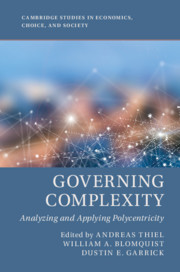Book contents
- Governing Complexity
- Cambridge Studies in Economics, Choice, and Society
- Governing Complexity
- Copyright page
- Contents
- Figures
- Tables
- Boxes
- Contributors
- Acknowledgements
- Introduction
- Part I Foundations for Understanding and Researching Polycentric Governance
- Part II Interactions and Performance in Polycentric Governance
- 5 Cooperation in Polycentric Governance Systems
- 6 Conflict and Conflict Resolution in Polycentric Governance Systems
- 7 Competition in Polycentric Governance Systems
- 8 Assessing Performance of Polycentric Governance System Interactions
- Part III Constituting Polycentric Governance
- Conclusions
- References
- Index
7 - Competition in Polycentric Governance Systems
from Part II - Interactions and Performance in Polycentric Governance
Published online by Cambridge University Press: 13 September 2019
- Governing Complexity
- Cambridge Studies in Economics, Choice, and Society
- Governing Complexity
- Copyright page
- Contents
- Figures
- Tables
- Boxes
- Contributors
- Acknowledgements
- Introduction
- Part I Foundations for Understanding and Researching Polycentric Governance
- Part II Interactions and Performance in Polycentric Governance
- 5 Cooperation in Polycentric Governance Systems
- 6 Conflict and Conflict Resolution in Polycentric Governance Systems
- 7 Competition in Polycentric Governance Systems
- 8 Assessing Performance of Polycentric Governance System Interactions
- Part III Constituting Polycentric Governance
- Conclusions
- References
- Index
Summary
The delivery of public goods often spurs competition between different authorities. Competition for scarce natural resources also triggers the creation of multiple decision-making centres as different actors seek venues where they can exert authority. Competition takes multiple forms and is linked with cooperation and conflict resolution to shape the rules governing resource users' interactions. We compare the evolution and performance of market-based water reallocation, and associated institutional reforms, in two polycentric water governance arrangements: the Ebro Basin of NE Spain and the US portion of the Columbia Basin. The chapter examines how authority structures, information and capacity influence competitive interactions within and across constitutional, collective choice, and operational levels of action. Polycentric governance arrangements vary in their distribution and coordination of authority, which shapes competition and performance. The comparison reveals trade-offs between efficiency and other performance criteria; efforts to facilitate efficient water reallocation may limit accountability and representation, and vice-versa.
Keywords
Information
- Type
- Chapter
- Information
- Governing ComplexityAnalyzing and Applying Polycentricity, pp. 152 - 172Publisher: Cambridge University PressPrint publication year: 2019
Accessibility standard: Unknown
Why this information is here
This section outlines the accessibility features of this content - including support for screen readers, full keyboard navigation and high-contrast display options. This may not be relevant for you.Accessibility Information
- 1
- Cited by
